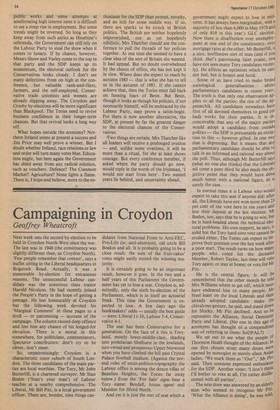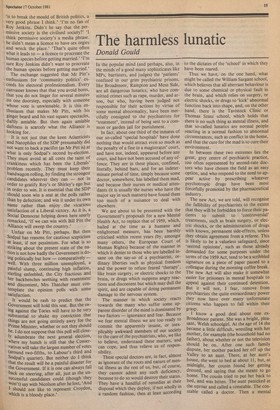Campaigning in Croydon
Geoffrey Wheatcroft
Next week sees the second by-election to be held in Croydon North-West since the war. The last was in 1948 (the constituency was slightly different then, as Croydon North). 'Few people remember that contest', says a leaflet sitting in the Liberal headquarters in Brigstock Road. Actually, it was a memorable by-election for extraneous reasons. The unsuccessful Labour candidate was the notorious class traitor Harold Nicolson. He had recently joined the People's Party in the hope of getting a peerage. He lost honourably at Croydon but the following week devoted his 'Marginal Comment' in these pages to a droll — or patronising — account of the campaign. The column caused deep offence and lost him any chance of his longed-for elevation. There is a moral in this somewhere, for politicians, commentators, Spectator contributors: don't try to be clever, don't sneer.
So, unpatronisingly: Croydon is a characteristic outer suburb of South London. The three candidates of the main parties are local worthies. The Tory, Mr John Butterfill, is a chartered surveyor. Mr Stan Boden (`Stan's your man') of Labour teaches at a nearby comprehensive. The Liberal, Mr Bill Pitt, is a local government officer. There are, besides, nine fringe can didates from National Front to Anti-EEC, Pro-Life (Sc. anti-abortion), old uncle Bill Boakes and all. It is probably going to be a close result: the sum of the fruit-cakes' votes might easily exceed the winning majority.
It is certainly going to be an important result, however it goes. ln the two and a half years of this Parliament the Government has yet to lose a seat. Croydon is, admittedly, only the sixth by-election of the Parliament, which is in itself an actuarial freak. This time the Government is expected to lose. A few days ago the bookmakers' odds — usually the best guide — were: Liberal 11-10, Labour 5-4, Conservative 4-1.
The seat has been Conservative for a generation. On the face of it this is Toryland, mostly lower-middle-class, shading into proletarian Shelhurst in the lowlands, into vernal and prosperous Upper Norwood when you have climbed the hill past Crystal Palace football stadium. (Against the normal rules of socio-politico-topography the Labour office is among the douce villas of Beaulieu Heights, the Tories far away below.) Even the 'For Sale' signs bear a Tory name: Bendall, house agent and Member for Ilford North.
And yet it is just the sort of seat which a government might expect to lose in midterm. It has always been marginalish, with a majority of less than 4,000 in May 1979 and of only 819 in this year's GLC election. Now there is disaffection over unemployment at one end of the constituency, over mortgage rates at the other. Mr Butterfill, is a nice, inoffensive sort of man (and if you think that's patronising faint praise, you have not seen many Tory candidates recently). He affects an optimism which he cannot feel, but is honest and lucid.
Some of us have tried to make broad sociological generalisations parliamentary candidates in recent years. The truth is that only one observation applies to all the parties: the rise of the apparatchik. All candidates nowadays have first of all devoted themselves to good (or bad) works for their parties. It is inconceivable that any of the major parties would adopt a candidate from outside politics — the SDP is presumably an exception to this — however gifted. In one way that is depressing. But it means that any parliamentary candidate should be able to talk in an informed and rational way about the poll. Thus, although Mr Butterfill says (what no one else thinks) that the Liberals wil come a poor third he also made the objective point that they would have done much better with a national figure, as is surely the case.
In normal times it is Labour who would expect to take this seat if anyone did: after all, the Liberals have not won more than 23 per cent of the vote here in ten years and lost their deposit at the last election. Mr Boden, too, says that he is going to win, but he is hard-headed about the technical electoral problems. His own support, he says, is solid but the Tory hard-core vote cannot be eroded either. The Tories can expect to improve their position over the last week after a poor start. The result turns on how manY people who voted for the deceased Member, Robert Taylor, last time will vote Tory again; or stay at home; or vote for Mr Pitt.
He is the central figure. It will be remembered that the other month he told Mrs Williams where to get off, which must have endeared him to many people. Mr Steel leant on the local Liberals and their already adopted candidate: make the chivalrous gesture, he said, and stand down for Shirley. Mr Pitt declined. And so he represents the Alliance, Social Democrat, Party and Liberal. (No one in this age °1 acronyms has thought of a compendious way of referring to them: SoDPAL?) We set out to see what the people of Thornton Heath thought of the Alliance. In our first chosen street many doors were opened by monoglot or merely silent Asian ladies. 'We mark them as "Out",' Mr Pitt said. Then someone expressed enthusiasm for the SDP. Another voter: 'I don't think I'll bother to vote at all. I'm rather disillusioned with all parties'. The next door was answered by an elderlY man who seemed to recognise Mr Pitt. 'What the Alliance is doing', he was told, `is to break the mould of British politics, a very good phrase I think.' I'm no fan of Roy Jenkins. Didn't he say that the permissive society is the civilised society?' I think permissive society's a media phrase. he didn't mean a licence to have sex orgies and wreck the place.' That's quite often what it leads to — a licence to procreate the human species before getting married.' I'm sure Roy Jenkins didn't want to procreate the human species before getting married.'
The exchange suggested that Mr Pitt's enthusiasm for `community politics' exceeds his electoral professionalism. Every canvasser knows that that you avoid bores, that you do not linger for several minutes on one doorstep, especially with someone Whose vote is unwinnable. It is this enthusiasm that makes Mr Pitt, with his ginger beard and his vast square spectacles, daftly amiable. But then again amiable daftness is scarcely what the Alliance is looking for.
It is not just that the keen Atlanticists and Natophiles of the SDP presumably did not want to back a pacifist (as Mr Pitt is) at what is only Sodpal's second by-election. They must avoid at all costs the taint of crankiness which has been the Liberals' problem recently. They must keep their bandwagon rolling, by finding the strongest candidates wherever they can — not in order to gratify Roy's or Shirley's ego but in order to win. It is essential that the SDP should soon win a seat at the polls rather than by defection; and win it under its own name rather than enjoy the vicarious satisfaction of a Liberal victory. As it is, a Social Democrat helping down here sourly remarked, 'If we can win with Bill Pitt the Alliance will sweep the country.'
Unfair on Mr Pitt, perhaps. But then Sodpal has reasons for cautious scepticism at least, if not pessimism. For what is so striking about the present state of the nation is not how badly the Government is doing politically but how — comparatively — well. With three million unemployed, a Painful slump, continuing high inflation, sterling enfeebled, the City fractious and her backbenches seething with resentment and discontent, Mrs Thatcher must contemplate the opinion polls with some satisfaction.
It would be rash to predict that the Government will hold this seat. But the swing against the Tories will have to be very substantial to shake my conviction that things are not going entirely awry for the Prime Minister, whether or not they should be. I do not suppose that this poll will closely adumbrate the next general election, Where my hunch is still that the Conservatives will take the largest number of votes (around two-fifths, to Labour's third and Sodpal's quarter). But neither do I think that the result will be a painful disaster for the Government. If it is one can always fall back on sneering, after all, just as the unsuccessful candidates could (though they won't) say with Nicolson after he lost, 'And I should not like to represent Croydon, Which is a bloody place.'







































 Previous page
Previous page